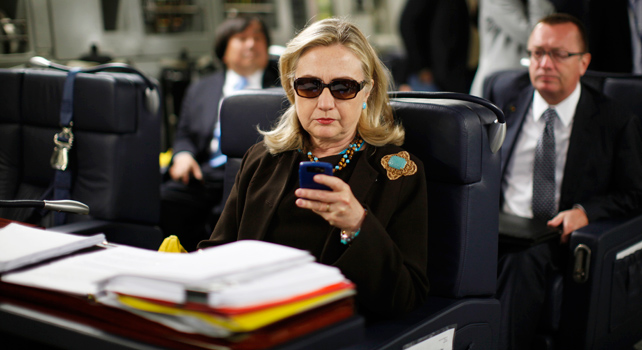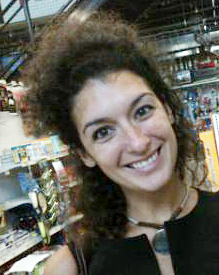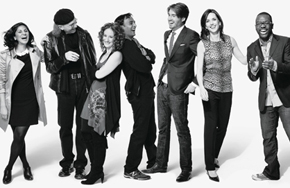From Bogota to Tunisia, “bad diplomat” Suzanne Philion has spent a decade shaking up old-school notions of a career in Foreign Service.

You know the picture of Hillary Clinton on the plane, texting with shades on? The behind-the-scenes image became an Internet meme in part because it was so unexpected, speaking volumes about a new era of American power abroad: cool, technologically cutting-edge, and female. Suzanne Philion, a 34-year-old who works under Clinton as Senior Advisor for Innovation in the Bureau of Education & Cultural Affairs at the U.S. State Department, embodies that new era. Foreign Service in the 21st century is far cooler than many people realize, she says, and thanks to ever-changing job assignments--not to mention an ever-changing global political landscape--it’s the perfect career for a Generation Fluxer who wants to serve her country and see the world, too.
 FAST COMPANY: In your Twitter profile, you describe yourself as a “bad diplomat.” Why?
FAST COMPANY: In your Twitter profile, you describe yourself as a “bad diplomat.” Why? SUZANNE: PHILION: I put “bad diplomat; mom” as my Twitter bio definitely to be funny, but also to create a distance from the unfortunate perception that diplomacy is an inaccessible, disengaged, bureaucratic thing. There are many of us who are very different than that. I think it’s important to break the historic impression.
What does a Senior Advisor for Innovation in the Bureau of Education & Cultural Affairs at the State Department actually do?
It’s a newly created position that I’ve had for the last year and a half, part of the public diplomacy machine at the State Department. It’s fun--I’m inventing as we go, working on ways to connect with foreign publics around the world, in person-to-person exchanges. The idea of my position, as Senior Advisor for Innovation, is finding ways to leverage technology to scale the impact of person-to-person diplomacy.
An important way that we get in the door in other countries--especially
with youth and lower-income people--is by providing quality English -language learning. So in Tunisia, for example, we partnered with the largest mobile provider there to launch a mobile-based English-language learning program following the Arab Spring. Tunisia has a lot of mobile penetration--and we wanted to reach beyond the urban populations. We developed content for SMS--largely fill-in-the-blinks, multiple-choice questions--and the idea is to do it in modern American English, including slang, and working with local content. In a country with 10 million people, in less than 90 days we had more than 535,000 unique users. That’s exciting. We don’t have endless resources for classroom learning; this showed the scalability of English learning via mobile. We’re developing pilots in other countries now, too. Finding ways like this to maintain a connection with people around the world is what's going to keep us competitive in the world and relevant as a population.
Do you get much resistance to the kinds of innovation you’re proposing?
About Generation Flux
Pioneers of the new (and chaotic) frontier of business

Flagship Fluxers, Photo: Brooke Nipar
In our February 2012 issue Fast Company Editor Robert Safian identified a diverse set of innovators who embrace instability, tolerate--and even enjoy--recalibrating careers, business models, and assumptions. People like author/Onion digital media maverick Baratunde Thurston, Greylock Data Scientist DJ Patil, Microsoft Senior Researcher danah boyd, and GE's Beth Comstock. This series continues to explore the new values of GenFlux. Find more Fluxers here. And tweet your contributions using #GenFlux.
I’d say that there was certainly significant resistance from some folks as we moved with more strategic purpose into the social media space. We needed to work with teams across the board to show the value of creating a Facebook page around a certain campaign, how to share information in as close to real time as possible via Twitter, whether pursuing opportunities in the mobile learning space made sense. But over the four years under Secretary Clinton, I’ve watched the naysayers diminish in huge numbers. From a sustainability perspective, it is critical that we work closely with folks to answer their questions and convince them that social media allows us to do things more effectively and to scale. Often our social media-oriented programs aren’t intended as a replacement for existing programs, but rather as a complement. For example, you can’t replace the power of in-person exchange, but you can certainly broaden access to virtual exchange opportunities through video conferencing platforms. We’re also working to share more with the public--through Facebook, Twitter, our blog--which helps people to understand what we’re doing abroad. That forces us to be more accountable, and serves multiple other goals, like improving our recruitment reach.
You’ve worked in the State Department for most of your working life--what keeps the job interesting?
As much as anyone, I need that new opportunity to come along to engage in a new way, to connect with new people, to learn new things. I’ve worked at one institution for 10 years--I feel like no one in my age range does that anymore. But one thing about Foreign Service is that it allows you to jump around and rotate jobs frequently. I’ve lived and worked in Brussels and in Bogota. My 4-year-old son was born in Colombia--he doesn’t look like it, but in his heart he is a little Latino.
Early on when you join the Foreign Service, you’re asked to choose what career path you want to pursue. There are five tracks--I chose public diplomacy. I was always interested in journalism. When I was in grad school, I wanted to be the next Christiane Amanpour, but after I did an internship at CNN, I realized I wanted to be on the other side of the camera, in a position to craft the content. The public-diplomacy "cone" allows us the unique opportunity to connect with a huge variety of people in any given country, including youth, journalists, civil society, the private sector, and academics.
I think the traditional conception of Foreign Service is, wrongly, one of aloofness. People picture dudes in navy suits, operating behind-closed-doors in a stuffy atmosphere. Because the majority of what we do as diplomats happens abroad, we have to explain ourselves better to make what we do accessible to the American people. One thing that has been amazing for me is observing and participating in the revolution within a bureaucracy as we embrace the digital space and break down the traditional conception of diplomacy. Secretary Clinton’s insertion of 21st Century Statecraft --using technology to help us better achieve our diplomatic and development goals--is part of that. What we accomplish in Belgrade or Kabul or Lima doesn’t just stay there--we are actively using digital tools to connect with a broader population. Our generation is already using these tools in our personal life--now you get to flip that and use these skills and linkages professionally.
So, what’s the ideal background for someone who wants to go into Foreign Service? How did you get into it?
I think the best tools you can bring to the table are great flexibility, lots of energy, and an awesome sense for adventure. I went to SUNY Binghamton, in upstate New York, and got a dual-major in Comparative Literature and French. I did a master’s program at the School of Foreign Service at Georgetown University and then worked for a year at the U.S. Trade and Development Agency. I still wasn’t sure what I wanted to be when I grew up--and I’m still not--so I took the Foreign Service test. It’s probably the last free test you can take. I went in with the attitude that I wasn’t expecting to pass. I did pass, and went on to the next stage, and ultimately came out with an offer on the table--an opportunity to be paid to travel, to engage with other cultures and learn languages.
What are the most important skills you’ve learned on the job?
Many people who come into the Foreign Service are driven by the desire to become an ambassador. You have to check that. This is about something much bigger than you and your actions and words reflect on your country. One thing I learned is to listen, and listen carefully--whether in person or digitally---to your colleagues and your counterparts in other countries. If you have a real two-way relationship, your efforts are going to have a greater impact. Bureaucracies aren’t famous for moving quickly, but at the same time there is pressure to get things done. Listening and establishing serious relationships with people is the way you do that.
What has been your most rewarding experience so far?
It was a huge honor to be part of the team that worked to free a group of hostages that was held by FARC in Colombia for more than five years. I had a mix of colleagues working on that, but mostly guys. To be a woman in that situation with the right language skills--my role was to engage with the public--was an amazing opportunity and thank God it worked out thanks to incredible talent on both sides and the huge bravery of our Colombian colleagues. There are more and more women in the service now, and if we’re going to properly represent the country while abroad, we need to represent both genders, LGBT people, the whole multicultural profile that is America.
The other really memorable experience was being in Tunisia. I didn’t know North Africa, and to be there on the ground shortly following their revolution--it still gives me tingles. I was part of a small team that stayed for a month to start public-policy engagement, meeting with Tunisian people. We didn’t have a lot of opportunity to engage there before--all of a sudden, the doors, the windows, the walls come down, and the opportunities are endless.
DIGITAL JUICE
No comments:
Post a Comment
Thank's!